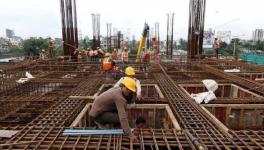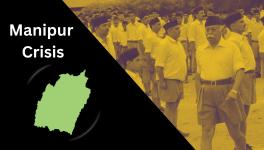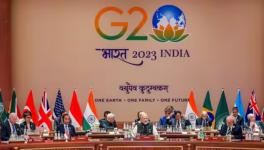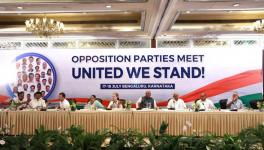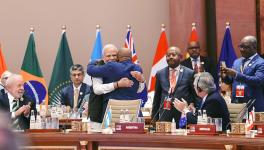India’s Poor Paid for G20 With Homes and Livelihoods Halted
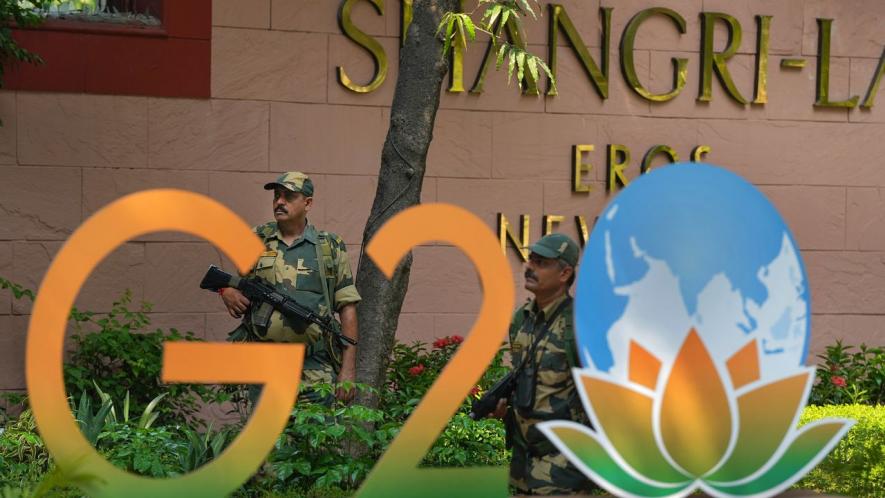
New Delhi: Security officials stand guard near a G20 Summit logo installed at Shangri-La Hotel as part of preparations for the upcoming summit, in New Delhi, Thursday, Sept. 7, 2023. (PTI Photo/Arun Sharma)
Occasions like the G20 presidency are an opportunity to boost a nation’s image and instil a sense of pride among citizens. A country’s standing in the international community matters, as do attracting tourism, boosting investment, and strengthening international cooperation. Yet, the domestic manifestations of ‘global’ events cannot be overlooked, for they create both gainers and losers.
So, while basking in pride, it is crucial for India to identify who gained and lost from the G20 events. India must be especially careful, lest we take from the poor whatever little they have and give it to the rich.
The range of distress caused to the poor by the preparations for the G20 summit has been widely reported all year. Since January, over 3 lakh of the capital’s poor have been displaced, while other cities that hosted G20 events reported more evictions and displacements. The lives of India’s poor are jeopardised in the process of urban ‘beautification’ projects meant to please visiting foreign dignitaries and other attendees.
Eighty per cent of Delhi’s workforce is employed in the informal sector, and 15% of its population lives below the poverty line. The city and central administrations, which prepare the capital for summits, have repeatedly behaved with contempt towards its poorest residents. Walls were constructed to hide the city’s poverty and poor residents during the Commonwealth Games in 2020. And in 2023, slums and shelters for the homeless were razed to make way for dazzling optics for the G20 Summit.
The city allocated a expense budget—Rs 1,000 crore—to prepare for this Summit and related events, choosing to chase away the poor rather than work towards poverty reduction. Slum settlements and shelters for the homeless were pulled apart or concealed and demolished with no alternative arrangements made for residents. In effect, more people have been left homeless and unemployed than before India decided to host this event. Homes were declared encroachments and bulldozed, roadside vendors were evicted, and lakhs whose voices are never heard were further destabilised. The brilliant lights of the newly-decorated city darkened lives—and the coming effective ‘shutdown’ of a large and prominent section of the city will worsen the situation.
When a city as large and economically diverse as Delhi is brought to a halt, people are likely to face challenges, significantly more so its weaker and disadvantaged sections. Of the ways in which the poor are affected, the easiest to identify is the loss of daily wages, for instance of the hawkers in parts of the city that are being subjected to near-total lockdown during the forthcoming summit.
While the lockdown may officially apply to sections of the city, roads passing through this crucial area will out of bounds during the days of the G20 programmes. It is bound to affect thoroughfare, having a ripple effect across the city.
Most of Delhi’s poor residents—over 49 lakh people, according to a 2022 estimate—work in the informal sector. They rely on daily wages to support themselves and their families. Any disruption in normal economic activities results in a substantial loss of income, making it difficult for families to meet basic needs. Many poor might find it impossible to stock up on essential food items to provide them with two meals a day when they are forced not to work. This is what leads to food insecurity and hunger for those who live from day to day.
Further, road and office closures can disrupt access to essential services such as healthcare, education, and social support. Vulnerable populations may find it challenging to access medical care or emergency services during this period. Even a short shutdown can have lasting economic consequences for poor individuals and the local economy. Job losses and income reductions during a shutdown can create financial struggles that persist after normal economic activities resume. It’s a fact that today’s food is tomorrow’s work energy: a poor worker who goes hungry today will not have the energy to work tomorrow, perpetuating poverty beyond the days when work was unavailable, and pushing families deeper into poverty.
It is crucial that governments host international events while ensuring that the urban poor are not disproportionately affected by disruptions. Proactive and inclusive policies are needed, which the government can put in place for the welfare of all citizens even as it showcases a city on the global stage.
It is essential for local authorities, NGOs, and community organisations to implement support measures, including targeted financial assistance, food distribution, access to health care services, and housing support for vulnerable populations, especially if a ‘shutdown’ like in Delhi is being imposed.
Any disturbance to normal economic activity is sure to hurt people, and people living on the margins will be disproportionately affected. Since the burden of disturbances is not equal for all, is important to design them very carefully. If a glittering capital is a must during the G20 presidency, it is equally important to hear voices of distress echoing from behind the glamour. The welfare of people is the single-most important domestic policy and it cannot be subservient to any other outcome, howsoever important it might appear.
To sum up, the well-being of the urban poor during the coming ‘shutdown’—call it by whatever name—is of the utmost importance. Here are some strategies to consider:
- Provide ample notice to the affected sections about the event and its impacts on their lives, in terms of gains and losses. Engaging in community consultations to understand and address needs and concerns is a must.
- Targeted financial assistance programs to compensate for lost income during the shutdown is a must. This could include cash transfers or subsidies to help families cover basic expenses.
- Temporary food distribution centres in affected areas must ensure that vulnerable households have access to nutritious meals, so that they can rejoin the workforce immediately on resumption of normal economic activity.
- Healthcare services, especially emergency services, must remain operational during the event. Mobile medical clinics should be considered for the affected neighbourhoods.
- Preventing evictions should be the priority and housing support must be provided for people whose homes and shelters have been razed.
The authors are associate professors at Zakir Husain Delhi College, University of Delhi. The views are personal.
Get the latest reports & analysis with people's perspective on Protests, movements & deep analytical videos, discussions of the current affairs in your Telegram app. Subscribe to NewsClick's Telegram channel & get Real-Time updates on stories, as they get published on our website.











